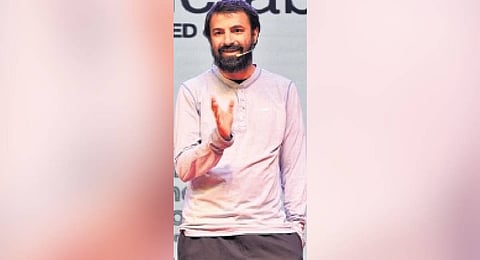

HYDERABAD: Who doesn’t love watching movies? For decades now, generations of audiences have enjoyed the performances of great actors and actresses in attractive locations, with action, romance, and comedy scenes par for course. But rarely do we stop to shower adulation on the brains behind it all the director.
There is one such brain in Tollywood too; when you watch his films on the big screen, you are just blown away by the mind-bogglingly impressive graphics and intricate storytelling. Be it Yevade Subramanyam, Mahanati, or Kalki 2898 AD, director Nag Ashwin knows how to captivate the audience until the very last second.
At the 10th edition of TEDxHyderabad, he charmed 1,200 people all over again with his intellectual perspectives, and had a candid conversation with CE about his journey, filmmaking, and more.
Excerpts.
How was your experience speaking at TEDxHyderabad?
I think we filmmakers or people from the industry get a lot more attention than we fully deserve, just because it’s a glamorous field. But I was very happy to listen to the other speakers. The work that I’ve done in life is not necessarily as important as what others are doing. So, I’m just privileged to speak at TEDx.
Did you always want to be a director? Take us through your journey.
I always wanted to be a writer. Cinema was always on my mind, but it was a very far-off dream because I had no idea how to get there. It was also a very conservative environment back then — everyone was thinking only about engineering and medicine.
They were encouraging of my writing as long as it was an extracurricular activity and not a life choice. My parents were worried and would say, ‘What will become of you?’ But I was passionate about writing and after a point, I think they gave in. I got my first break as an assistant director to Ajay Sastry for the movie Nenu Meeku Telusa? in 2008. It’s been quite a journey!
What is your creative process like?
A lot of research goes into it of course. But when I’m trying to write and do not get ideas, I just look out of the window — all the answers come to me. Essentially, you need to find inspiration in something that really excites you and the idea will come from there. It could be an image or a piece of writing; inspiration comes from different places and I process it while staring out of the window.
How did you deal with any rejection that came your way?
Before I made my first film, there was a bit of anger and frustration over rejections — I would think, ‘How can they not understand this?’ Every young filmmaker goes through these emotions. What I have realised is that everyone experiences art differently. Even if I do get negative comments now, it can affect me depending on the mindspace I’m in but I try to be grateful that the majority of comments are positive.
What do you think should be the aim of filmmaking?
My aim is to make films that are enjoyable — I think films are just experiences that people want to have for three hours, away from their regular life. It could be a commercial film, action film, comedy film, or romance film. There’s no right or wrong; you can make any kind of film as long as you stay true to it and make your audience enjoy it.
What is your opinion on the younger generation of actors and filmmakers in the industry?
The industry is definitely changing for the better and there are more opportunities for young writers and directors. There is more access to good equipment and software now. For example, getting a cinematic shot back in the day was very expensive but today, you can choose the cinematic mode on your iPhone and shoot. With AI, it’s going to become even more democratised. But I will still say it is more about the story than the technology — even with the best VFX and set design, Kalki 2898 AD wouldn’t have been impactful if the story didn’t connect with people.
I’ve been lucky that everyone who came my way taught me how to make films better. Actor Nani was of great help during my first film, always giving me that moral and practical support. Veteran actors like Amitabh Bachchan and Kamal Haasan have a lot of patience and humility. They know the importance of not sharing their experience sometimes on set and have an attitude of ‘Hey, maybe there’s a new way to do this, let’s watch.’
If not a director, what would you be?
I was training to be a journalist actually. I was always passionate about writing.